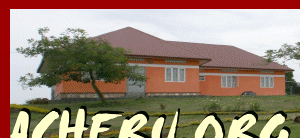| Circular -
June 2020: how Covid 19 affects Acheru, and news of more recent staff members. |
| First, some news of how Acheru is coping with all the difficulties around the Covid 19 virus. The Ugandan government reacted very quickly to the outbreak in China, before most countries did anything. They introduced a regime of testing and quarantine for everyone entering the country and this may be why infection hasn't become widespread there. Uganda has only a small number of cases, and I've heard various reasons suggested for this some of which may be at least partly true. There's conjecture about the effect of heat or sunlight on the virus, but other hot countries have seen a significant spread of infection. Some say that because Ugandans brought up in the village are confronted with a range of infections, they develop resistance. Another suggestion relates to Uganda having a very young population, children being less likely to become infected, and yet a number of Ugandan children returning from overseas have tested positive for the virus. And of course, as with many other countries, the numbers tested may represent only a very small number of those who are infected. There's as yet very little scientific evidence to back up any of these theories; perhaps, for whatever reason, the virus won't spread much; perhaps a major factor has been the quick government reaction. |
| Wherever the truth lies, it's evident that the lockdown, with all its restrictions, is having a severe effect particularly among the poorest people, and the government is now seeking ways to gradually ease this without taking too many risks. The transport restrictions impeded the work of Acheru. Those staff not living on site or nearby can't use public transport to get there, and most patients can't travel there either. Community work and outpatient clinics had to be suspended. Joyce managed to get permits enabling the ambulance to be used to take patients to and from CoRSU and to Minakulu in the north. Work continues in Acheru with a reduced number of inpatients, controlled access to the site, and responsibilities assigned to the staff members to try to ensure the protection of all the workers, patients, and carers. Fortunately Acheru usually bought food in bulk so shortages didn't present an immediate problem. |
| Some limited outpatient work is now being conducted for children who live locally, and children from the surrounding area who have had minor surgery at CoRSU are referred to Acheru when they return home. Some patients are monitored by phone calls. It's far from ideal but everyone is doing their best in difficult circumstances to maintain an effective service. |
| Staff: From time to time we have to cope with staff changes at Acheru. Sometimes this meant losing a very experienced person and having to appoint a much younger replacement, perhaps only recently qualified. Acheru is small, so it's usual for it to be an applicant's first position. We've had experienced staff dealing with nursing, physiotherapy, orthopaedics, and education who have left us to take up new posts. We've missed them, but it's also pleasing to know that the skills and experience acquired at Acheru are becoming more widely used. We thus see the influence of Acheru touching many more lives. |
| While we've been sorry to lose valued staff members, and in some ways miss their experience, we shouldn't underestimate the contribution of their replacements. While they may be younger, and only recently qualified, they can bring new ideas and enthusiasm. To some extent their lack of experience is compensated through their use of social media to keep in touch with others they studied with, to discuss and compare notes on conditions and treatments. |
| Of course too many changes can be disruptive and unsettling for patients who may be undergoing lengthy treatment, but we are also thankful for the continuity provided by a number of long serving staff. Joyce, Harriet, Margaret, and Stephen have been with us from the outset, helping provide a stable environment for patients, relatives, and recent recruits. |
| Those more recently appointed include: |
| Isaac Watum, a recently qualified 23 year old nurse now gaining experience with a wide variety of patients. |
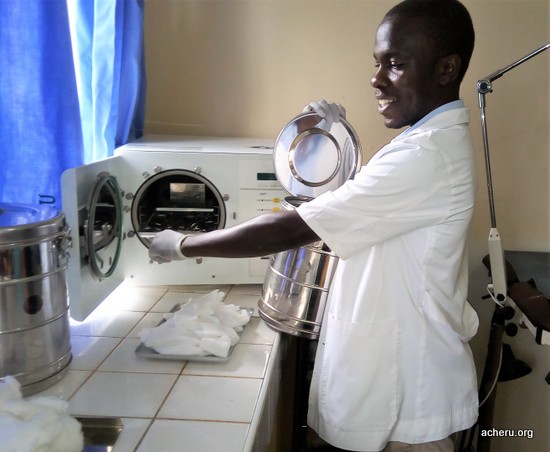
|
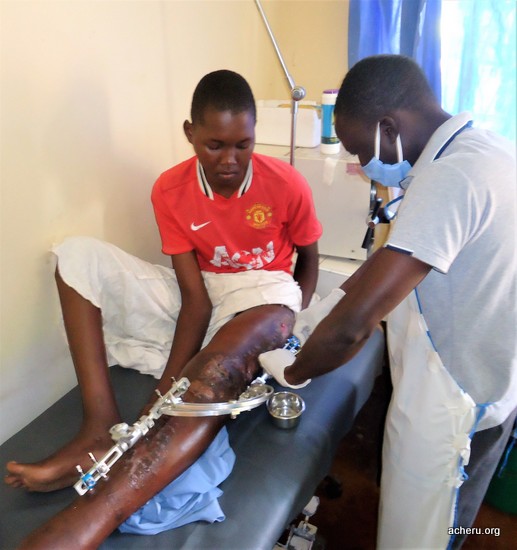
|
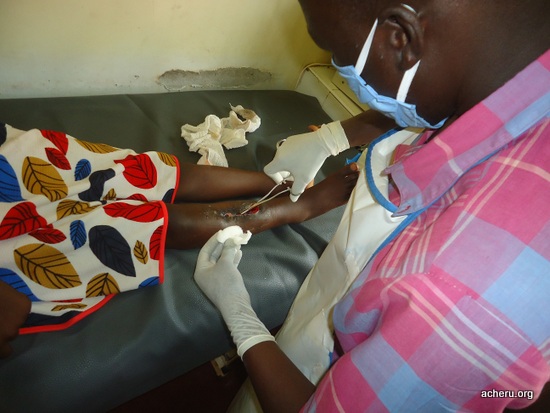
|
| Isaac |
| Buyinza Ronald, 31 years old, qualified in orthopaedic technology and with five years previous experience. |
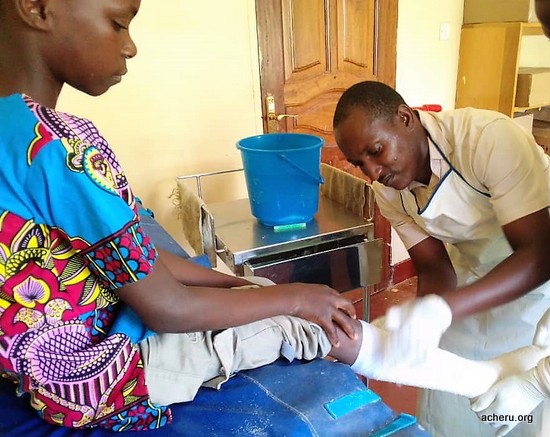
|
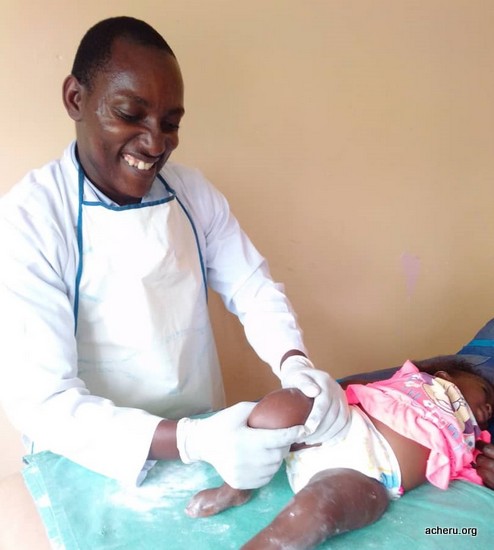
|
| Ronald |
| Anena Fiona Daphne, a 21 year old recently qualified physiotherapy graduate. |
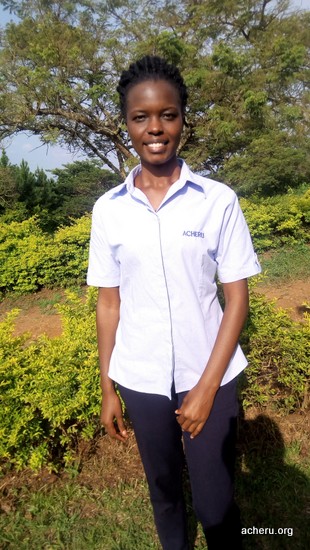
|
| Anena Daphne |
| Mwaita Brian, a 22 year old teacher with two years experience before joining Acheru. |
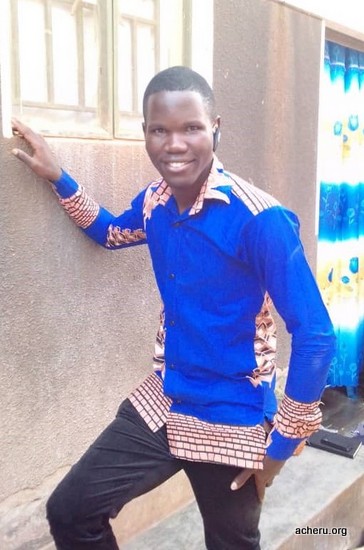
|
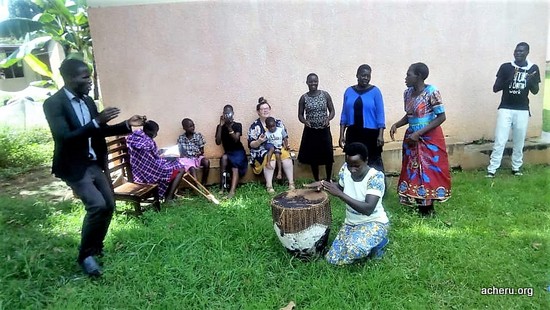
|
| Brian |
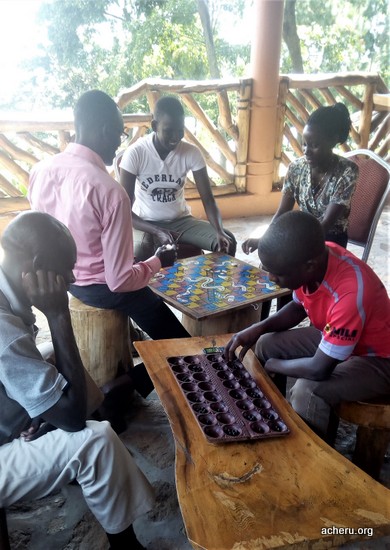
|
| Staff outing |
| We hope that the wide range of work undertaken at Acheru will help them develop their skills, and we want to do what we can to assist with their career development. |
| At Acheru we have been trying, dependent on finance, to implement a development plan. This hasn't proved to be the ideal time to launch this, in the midst of so much uncertainty. Our priority at present is to try to ensure that we can provide the monthly budget, with any additional work dependent on 'new' money. Nevertheless, we have been given some help towards the work planned so have been able to make a start. We hope that some of the improvements will encourage the new staff members, and also help us get maximum benefit from their skills. Basic facilities were acceptable when Acheru started, but need updating to get the best from staff who may be used to better, or want to develop their own ideas. |
| It will facilitate Isaac's work if we can improve lighting in the treatment room and install a solar water heater and back up lighting to deal with the frequent power cuts. |
| Daphine, the physiotherapist, finds her work limited by a lack of equipment, things which are available locally at modest cost, and we've already been able to deal with some of these. |
| Ronald has experience of orthotics and wants to make his own, saving time and money. For this we will need to buy some equipment including an oven and grinder. |
| Brian very quickly demonstrated his enthusiasm for teaching, working with the carers as well as the children to lead fellowship and develop Acheru's witness. We had already identified the need to make improvements, and want to make the resources available to let Brian develop his ideas. He now takes responsibility for IT at Acheru, dealing with computer maintenance and social media platforms which are becoming an increasingly important part of the work. |
| Any improvements can raise standards of care and treatment and this in turn enhances our witness and influence. It says much that people want to come and work at Acheru and there's never a problem replacing staff. It's also clear that Acheru's reputation is such that staff who leave seem to have no difficulty moving on to more senior positions. |
| The statistics kept at Acheru show the details of the children treated. What they can't show is the number benefitting indirectly due to the continuing work of former staff members, or the impact of Acheru on how families and communities may care for other disabled children. |
| I've recently read a fascinating, comprehensive and insightful book on Africa by Richard Dowden and I intend to refer to it in future circulars. Here's one quote: "In most of Africa the churches have delivered more real development than all the governments, the World Bank and aid agencies combined." |
